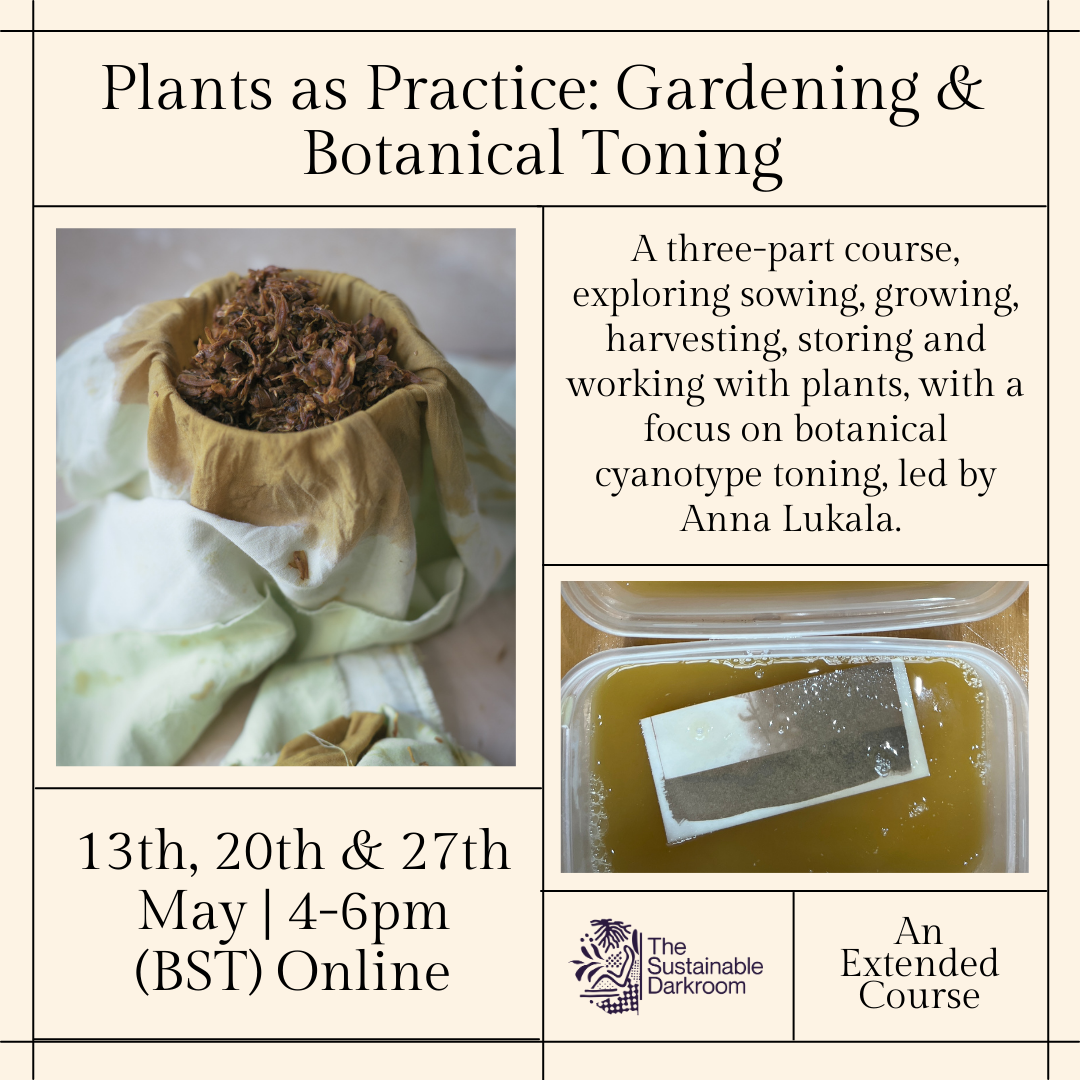The Sustainable Darkroom
Plants As Practice: Gardening & Botanical Toning
Plants As Practice: Gardening & Botanical Toning
Couldn't load pickup availability
The Sustainable Darkroom invites you to participate in our Slow Photography series, fusing theory and practice, to provide you with a deeper and more critical view of sustainability in photographic and filmmaking practice.
This is a three-part, online workshop taking place over the following Tuesdays in May: 13th, 20th and 27th from 4pm - 6pm (BST) online.
Participants will have access to full workshop recordings for 4 weeks.
Over the weeks we will comprehensively cover the use of plants in creative practice from seed to photographic application. Specifically focusing on their use as botanical cyanotype toners. You will learn how to extract vibrant colours from plants in line with ancient folk traditions and discover the basics of plant chemistry that will help you identify and select plants suitable as sources for plant ink and cyanotype toning.
We will explore the role of being plant custodians and the rituals surrounding planting, growing, caring, harvesting, and storing plants in a sustainable and reciprocal way. You will leave with ideas on how to choose your own pigment plants for future projects that can be grown in anything from a small window box to a larger garden, as well as examples of what can be foraged in the wild.
Experience Level: No previous plant, sowing, propagating or gardening experience needed. However, participants are required to prepare their own cyanotypes in advance of the botanical toning session, therefore an understanding of how to make cyanotypes is needed. If you need guidance on this, we recommend following Melanie King’s instructional video here.
Tools:
- 4-5 Trays (these can be old tupperware or similar)
- 1 x Thermometer
- 1 x Saucepan (not for food use)
- 2-3 x Muslin cloth / old piece of sheet to filter out plant matter
- Pegs & string
- Litmus paper (can be handy but not a must)
- Vinyl / marigold (washing-up) gloves, or tongs
Materials:
- Plant matter (flowers, leaves, tannins, etc. you will be provided with a suggestion list before the workshop)
- Cyanotypes (can be paper or fabric or a mix of both)
- Washing soda (sodium Carbonate)
- Access to water
- Something acidic (such as lemon juice, critic acid or vinegar)
-
A notebook & pencil
Session 1:
Plants Beyond the Ornamental: Growth and Care (13th May)
In this session, we will cover:
-Materials and prep needed for toning in week 2
- Gardening, and plant uses historically beyond the ornamental, why it matters and how it informs Anna’s practice.
- An introduction to how and why Anna works with certain plants, how she chooses them and how she cares for them.
- Working in reciprocity with plants.
- Historic folk uses of plants and colours (dyes, inks, lakes, paints, food, medicine) and how this knowledge is useful when considering botanical toning
- Planning your own garden and ideas for different locations, formats and scales.
- Tips and recommendations for planting, germination and growth
Self-directed work will include making cyanotypes and gathering materials in preparation for week 2.
Session 2: Plants in Photographic Practice (20th May)
In this session, we will cover:
Let’s do some botanical toning!
-Making the toners: extracting pigment and tannins from plant sources.
-Explanation and examples of toning vs. staining cyanotypes.
- Paper stocks & testing
-When, how and what to look for when bleaching the colour.
-Using the toners & Importance of temperature.
-Split toning
- Modifications & Ph shifting
- Managing waste solutions & left over plant matter
Self-directed work will include further experimentation and testing.
Session 3: Plants as storytellers (27th May)
In this session, we will cover:
- Review of works made during the week and time for troubleshooting
- A chance to connect and compare results
-Seed collecting and storing
- Practical ideas around reciprocity including composting, wormeries and water harvest
- Extending periods of flowering and flourishing
- Harvesting and storing from root to tip
- Seed keeping
- Dormant seasons
------
Anna Lukala is a process-based visual artist with a primary focus on exploring sustainable photographic processes. She can often be found foraging for natural colours and materials from her immediate surroundings, as well as from her dedicated pigment garden. Her work draws inspiration from the intricate interconnectedness of natural ecosystems and the rich heritage of historic folk traditions. Anna's creations are known for their tactile qualities, prompting viewers to perceive the land around us in new and thought-provoking ways. Her exploration of materiality and dedication to sustainable solutions are central to her practice, often taking precedence over the final artistic outcomes.
www.annalukala.com
For concessionary tickets, please email us. (sustainabledarkroom@gmail.com)
Share


